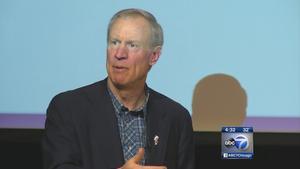Rauner’s plan to withhold low-income energy assistance money draws concern
The governor’s plan to withhold state money that helps poor residents pay their electric and gas bills was met with concern and resistance Thursday at a hearing in Chicago.
Seniors, people with disabilities and parents of young children shared stories of hardship at the Loop hearing, saying in written or oral testimony that they rely on the money to heat and cool their homes during frigid Illinois winters and sweltering summers. The program, they said, also helps preserve basic decencies such as the ability to cook, refrigerate food, wash clothes and take a hot shower.
“We live in a state that experiences, at times, some severe weather conditions, so it is a health and safety issue,” said Dalitso Sulamoyo, president and CEO of the Illinois Association of Community Action Agencies, which represents those that administer the low-income energy assistance program.
The move comes as part of the evolving budget drama that has consumed the state. Gov. Bruce Rauner announced plans earlier this month to suspend the state-funded portion of the program July 1 as part of a sweeping proposal of spending cuts that included programs that help the poor with child care costs and help the elderly stay out of nursing homes.
The Republican governor has billed the cuts as a way to show how he will deal with a deficit-ridden Democratic state budget that has yet to reach his desk. They also represent an attempt to pressure some Democratic lawmakers to agree to the pro-business, anti-union agenda he has made a condition of getting a budget agreement.
Democrats have approved a spending plan that is at least $3 billion short. Rauner’s office said in a statement that the suspension of the state portion of the low-income energy assistance program “is one step the administration is taking to build reserves.”
The program, which helped lower energy bills for about 400,000 Illinois households last year, is funded through federal dollars and state fees that are collected from Illinois utility customers.
Participating utilities include Commonwealth Edison and Peoples Gas, which distribute electricity and gas to Chicago customers.
Residential customers pay a 48-cent monthly fee on their electric bills and gas bills. Commercial and industrial customers are charged a usage-based fee. In total, the state program has pulled in $90 to $95 million a year, representing about a third of the program’s funding, according to the Department of Commerce and Economic Opportunity, which distributes the money to community agencies.
Although utility customers will continue to pay fees every month, that money will now be held by the state, “in the event they need to be reallocated to fill the massive budget hole in the Madigan-Cullerton budget,” department spokeswoman Lyndsey Walters said.
That reallocation, however, would require legislative approval.
“What good does it do to suspend this when you can’t use it without our authorization?” Democratic Sen. Terry Link of Waukegan asked Michael Hoffman, the chief operating officer of the Department of Commerce and Economic Opportunity, during the hearing. “You’re trying to hold a political hammer over our heads.”
Hoffman said that the length and nature of the suspension would depend on budget negotiations, adding at a later point that none of the proposed cuts were being taken lightly or without regard to impact.
“We are suspending the money at the direction of the Governor’s office in order to maintain flexibility,” Hoffman said.
At the same time, Republican Sen. Matt Murphy of Palatine questioned how the move was substantively different from a Senate bill that lawmakers agreed to earlier this year that would have allowed the governor to sweep money from dozens of state funds, including the energy assistance fund.
That effort was later put on hold.
The state created supplemental funding for the energy assistance program in the late ’90s, finding that low-income households will forgo payments on their utilities if they are unable to also afford necessities such as food, shelter and medical care. Utility customers absorb the cost of unpaid bills through higher rates.
The program, which Sulamoyo said is broke because of higher demand, will still receive about $165 to $170 million from the federal government. But that will not be until October or November.
Sulamoyo said the elimination in state funding could jeopardize efforts this summer to help keep air conditioners running and will likely delay enrollment in the fall, possibly leaving vulnerable residents without heat this winter. As it is, the program is only able to cover 38 percent of eligible Illinois households, according to Sulamoyo.
The program serves households that are at or below 150 percent of the federal poverty guideline. For a family of four that would mean a yearly income up to about $36,000, Sulamoyo said.
Lillian Drummond, 93, a community activist who benefits from the energy assistance program, said she relies on it to supplement her fixed income. Drummond said she has helped others who have struggled to keep their gas and electricity running, sometimes having to choose between those services and buying medicine or food.
“It’s easy for those of you to say cut programs that support low-income households, if you have never had to walk in their shoes,” Drummond said. “Being a senior is scary (if) you’re on a fixed income.”







